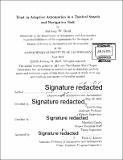Trust in adaptive automation in a tactical search and navigation task
Author(s)
Broll, Anthony W
DownloadFull printable version (33.13Mb)
Other Contributors
Massachusetts Institute of Technology. Department of Aeronautics and Astronautics.
Advisor
Leia Stirling and Meredith Cunha.
Terms of use
Metadata
Show full item recordAbstract
Handheld smart phone devices incorporate communication and mapping tools into small military squads to increase their effectiveness. These devices link a squad with headquarters, satellites and unmanned aerial vehicles to provide them with up to date intelligence. This information is filtered by adaptive technology which prioritizes the most vital pieces. An indoor search and navigation experiment was conducted to determine the appropriate type of automation (adaptive or adaptable) to prioritize this intelligence for decision makers in an uncertain, time-critical scenario. An experiment was conducted with eight males in their early 20's actively serving the US military or part of a training program. Subjects utilized an app on an HTC Desire designed to navigate the user indoors from a start QR code to a goal QR code while collecting additional QR codes to maximize their point totals within three minutes. Subjects utilized the app in one of two modes: computer-select (adaptive automation) and user-choice (adaptable automation). In addition, updates in the form of floor closures would occur in half of the 24 trials. Results of the study showed a preference for computer-select with better performance on the primary task. Users ended up using both systems as a type of user-choice by disregarding the app's path planning beyond the initial route. The user preference for computer-select was tied to the ability of the system to adjust to the human instead of the user having to tell the system what it was doing. Subjects wanted the flexibility of adaptable and user-choice before the trial to plan and define their own route, but once the trial began, the subject's temporal demand was too high to want to maintain that level of control beyond the subject's actions in the real world.
Description
Thesis: S.M., Massachusetts Institute of Technology, Department of Aeronautics and Astronautics, 2016. Cataloged from PDF version of thesis. Includes bibliographical references (pages 271-275).
Date issued
2016Department
Massachusetts Institute of Technology. Department of Aeronautics and AstronauticsPublisher
Massachusetts Institute of Technology
Keywords
Aeronautics and Astronautics.